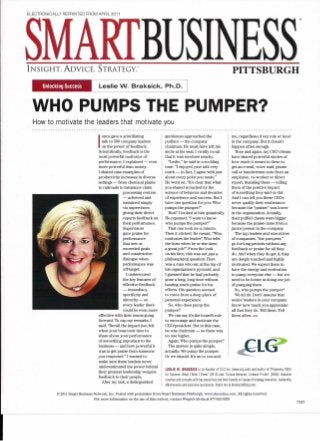
Who Pumps The Pumper
- 1. ELECTRONICALLY REPRINTED FROM APRIL 2011 INSIGHT. ADVICE. STRATEGY: _"-----_L_e_S_I_ie_W_._B_r_a_k_S_i_C_k_,_P_h_"O_"---.J ® PITTSBURGH WHO PUMPS THE PUMPER? How to motivate the leaders that motivate you I once gave a scintillating talk to 500 company leaders on the power of feedback. Scientifically, feedback is the most powerful motivator of performance, I explained - even more powerful than money. I shared case examples of productivity increases in diverse settings - from chemical plants to railroads to insurance claim processing centers - achieved and sustained simply via supervisors giving their direct reports feedback on their performance. Supervisors gave praise for performance that met or exceeded goals and constructive dialogue when performance was off-target. I underscored the key features of effective feedback - immediacy, specificity and sincerity - so every leader there could be even more effective with their teams going forward. To cap my remarks, I said, "Recall the impact you felt when your boss took time to share about your performance of something important to the business - and how powerful it was to get praise from someone you respected." I wanted to make sure these leaders never underestimated the power behind their greatest leadership weapon: feedback to their people. After my talk, a distinguished gentleman approached the podium - the company chairman. He must have left his smile at his seat; I vividly recall that it was nowhere nearby. "Leslie," he said in a scolding tone. "I enjoyed your talk very much - in fact, I agree with just about every point you made." He went on: "It's clear that what you shared is backed by the science of behavior and decades of experience and success. But I have one question for you: Who pumps the pumper?" Huh? I looked at him quizzically. He repeated: "I want to know who pumps the pumper?" That one took me a minute. Then it clicked. He meant, "Who motivates the leader? Who tells the boss when he or she does a great job?" From the look on his face, this was not just a philosophical question. Here was a man who sat at the top of his organization's pyramid, and I guessed that he had probably gone a long, long time without hearing much praise for his efforts. His question seemed to come from a deep place of personal experience. So, who does pump the pumper? We can say it's the board's role to encourage and motivate the CEO/president. But in this case, he was chairman - so there was no one higher. Again: Who pumps the pumper? The answer is quite simple, actually: We pump the pumper. Or we should. It's UP to vou and me, regardless of our role or level in the company. But it doesn't happen often enough. Time and again, my CEO clients have shared powerful stories of how much it meant to them to get an e-mail, voice mail, phone call or handwritten note from an employee, co-worker or direct report, thanking them - telling them of the positive impact of something they said or did. And I can tell you these CEOs never qualify their exuberance because the "praiser" was lower in the organization. Actually, their puffed chests were bigger because the praise came from a junior person in the company. The top leaders and executives of companies, "the pumpers," go for long periods without any feedback or praise for all they do. And when they do get it, they are deeply touched and highly motivated. We expect them to have the energy and motivation to pump everyone else - but we need to be better at doing our job of pumping them. So, who pumps the pumper? We all do. Don't assume that senior leaders in your company know how much you appreciate all that they do. Tell them. Tell them often. « --6> LESLIE W. BRAKSICK is co-founder of CLG Inc. (www.clg.com) and author of "Preparing CEOs for Success: What I Wish I Knew" (2010) and "Unlock Behavior, Unleash Profits" (2006). Braksick coaches and consults with top executives and their boards on issues of strategy execution, leadership effectiveness and executive succession. Reachher at Ibraksick@clg.com. © 2011 Smart Business Network, Inc. Posted with permission from Smart Business Pittsburgh. www.sbnonline.com. All rights reserved. For more information on the use of this content, contact Wright's Media at 877-652-5295 77527